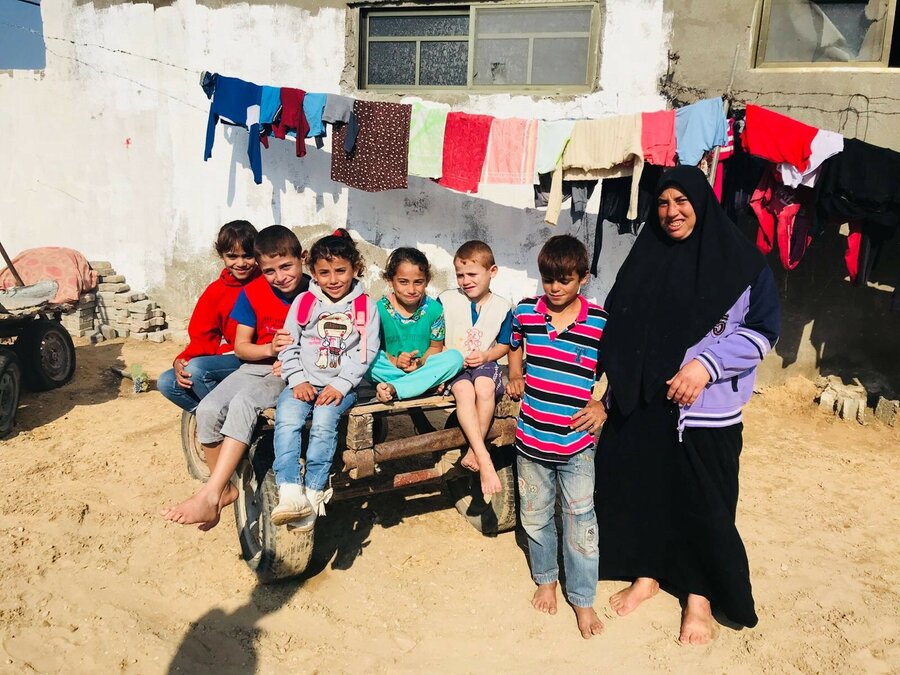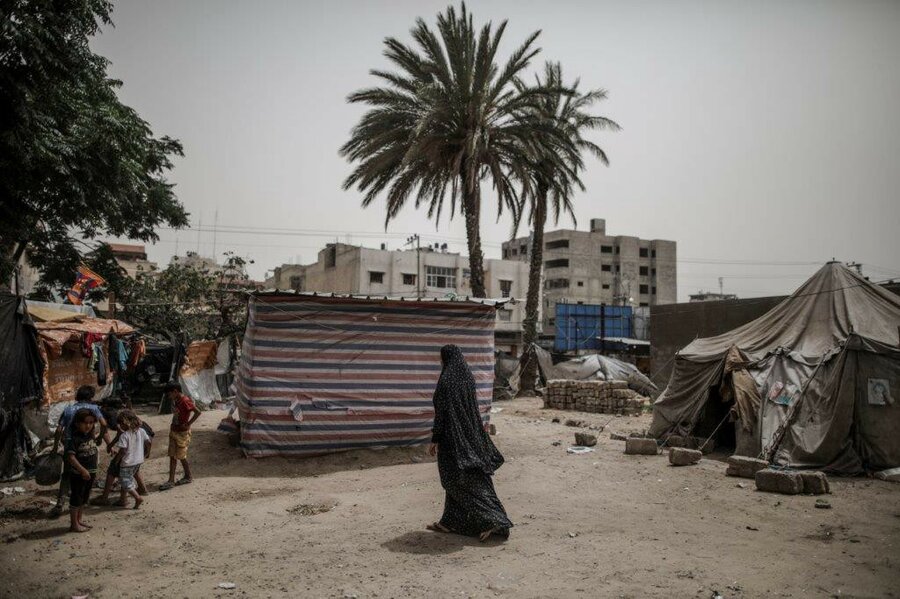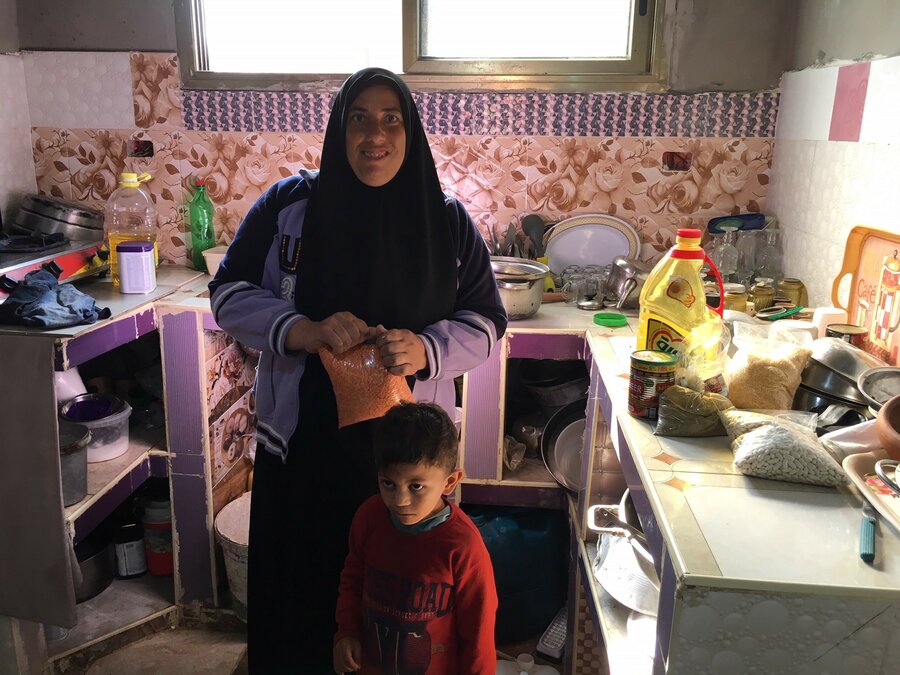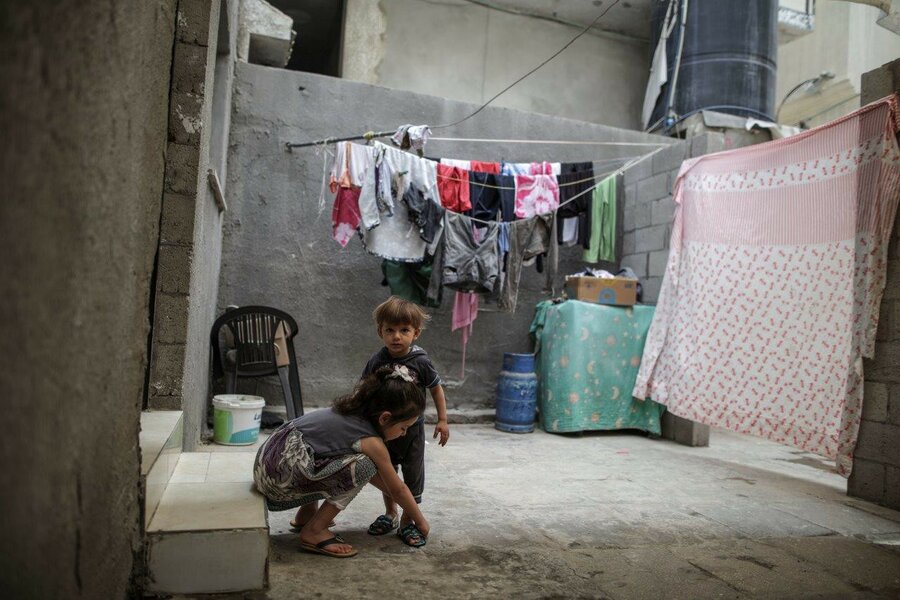The human face of Gaza hardships

Sanuora, a divorced mother, lives with her six children and her brother at her parents' home in Beitlahia, North Gaza. She and her family have always lived in poverty, trying to make ends meet with the help of friends and relatives. She dropped out of school when she was 11 because her family could not afford an education for each of their seven children. Now, as a single mother without any qualifications or work experience, finding a job is like looking for a needle in a haystack for her. The current unemployment rate in Gaza has reached almost 50 percent — the highest recorded rate in the world — in 2018, peaking at two thirds among women.
Since her divorce, Sanuora has been completely dependent on external assistance and has enlisted in multiple national social assistance programmes. She receives food, cash and medical support and relies on a share of the slim income her brother makes working as a casual labourer in construction. But this is not enough. "I have accumulated too many debts that I need to repay each month. My parents' house was too small to host my large family when I left my husband. We had to borrow 5,000 New Israeli Shekels (NIS) — the equivalent of US$ 1,500 dollars — from relatives to build an extra room." Each month, she uses the cash assistance she receives from the national social transfer scheme to repay her longstanding dues.
The assistance provided by the WFP has been vital for Sanuora to feed her family and buy other essentials like clothes and soap. Although her food entitlements had never been sufficient to meet the needs of all family members, her friends and relatives used to help and share meals with her. However, as the already dire living conditions in Gaza continue to deteriorate, Sanuora can no longer rely on their generosity.

Since April 2017, recurrent electricity shortages have left residents with as little as four hours of power a day. The energy blackouts have been damaging all economic activities, which further limits employment opportunities and erodes people's already limited resources and ability to meet essential needs, including access to life-saving medical care and safe water treatment.
The lack of electricity is also forcing Sanuora to purchase dry goods instead of fresh products and dairy, as she can no longer store food in her refrigerator nor use her makeshift oven. She has resorted to cooking over a fire as gas has become too expensive. "Every day is worse than the previous," she says.
Against the backdrop of widespread poverty — which affects more than one in two people in Gaza — the crisis is taking the heaviest toll on the most vulnerable like Sanuora, who have few if any resources to cope with increased hardship and high levels of food insecurity.

"My brother stopped working and my friends and family can no longer afford to support me. I had no choice but to take on additional loans so that my children would not have to sleep on an empty stomach," Sanuora says. There seems to be no end in sight for the debt spiral she has fallen into. "I owe 3,000 NIS (US$ 850) to shop-keepers for food, and ‘millions' (sic) of Shekels to the local electricity and water supply company," she adds.
Sanuora is one of the 245,000 severely food-insecure non-refugees WFP has been assisting daily since the beginning of the year. All fall far below the poverty line of US$ 3.7 per day per person, with no prospects for a better future.
Purchasing food and other necessities on credit continues to be one of the main mechanisms people adopt to cope with an increasingly difficult situation, which also include skipping meals, buying cheaper food — often of poorer quality — and sending children to school without food or pocket money for lunch.

Findings from WFP's 2018 monitoring showed that 75 percent of WFP beneficiary households in Gaza are heavily indebted, with an average debt of US$ 4,300: US$ 2,820 for electricity and water, US$ 260 for groceries, and US$ 1,215 worth of credit from friends and relatives. On average, people assisted by WFP in Gaza can find work for 5.5 days per month and live on a daily budget of US$1 dollar.
When continuously provided, WFP food assistance is a fundamental safety net for the poorest whose ability to graduate out of poverty and social assistance is hindered by the collapse of the economy and increased access restrictions to basic services. In this alarming context, any suspension of assistance will inexorably lead to further levels of poverty. At this pace, the United Nations has warned that the small enclave is to become uninhabitable by 2020.
To offset the impact of reduced directed donor support, WFP Palestine relied on an unprecedented level of multilateral funding this year, including an emergency corporate loan from the Immediate Response Account. Multilateral contributions and direct support to the Immediate Response Account from donors such as Sweden, Germany, Switzerland, Belgium, the Netherlands and Japan were instrumental in keeping operations afloat. The flexible nature of this support empowered WFP to continue and scale up its cash assistance in Gaza, preventing vulnerable populations from falling into a deeper state of insecurity and supporting an economy with 50 percent of unemployment.
